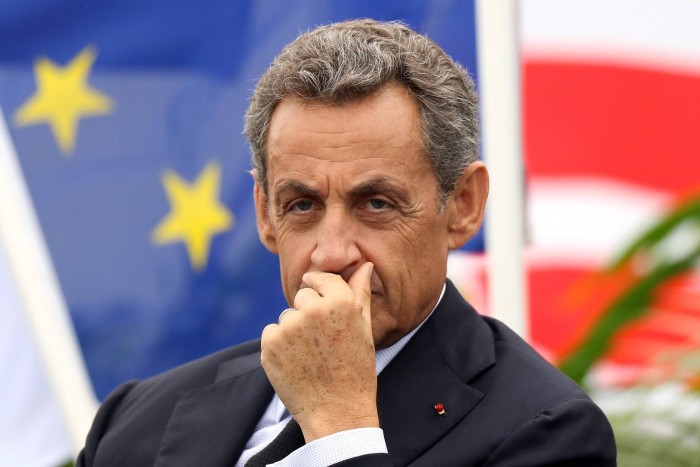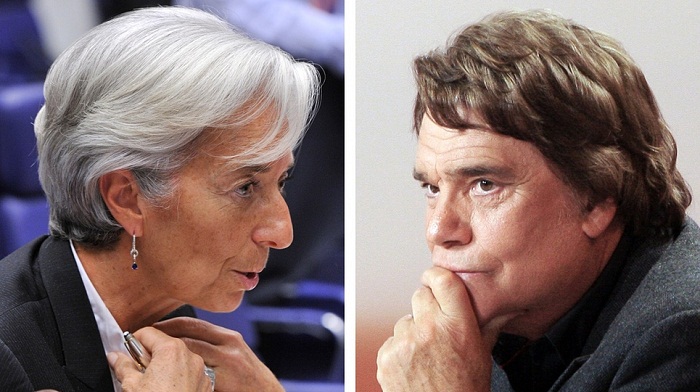Tapie, a former French football team owner and pop star, was awarded the money in a case against the French public bank Crédit Lyonnais, which he accused of undervaluing his stake in Adidas. Lagarde, at the time Sarkozy’s finance minister, referred the long-running case to arbitration and signed off the payout.
French detectives have been looking into whether Tapie was offered a deal in return for supporting Sarkozy in the 2007 presidential election and whether Lagarde was acting on orders of the Elysée Palace – namely Sarkozy – by referring the case to private arbitration.
In ordering a trial, the Cour de Justice de la République, which handles criminal allegations against government officials, went against a ministerial recommendation in September to drop the case against Lagarde.
Thursday’s legal decision was described by Lagarde, who is contesting the case, as “difficult to comprehend”.
Lagarde’s lawyer, Yves Repiquet, told French TV: “It’s incomprehensible. I will recommend that Madame Lagarde appeal against this decision.”
It is the latest twist in a two decade wrangle that began when Tapie sold his majority stake in the then ailing Adidas to a group of private investors for €315.5m. Tapie agreed to the 1993 sale to avoid any conflict of interests when he became a minister in the then Socialist government under François Mitterrand. A year later, the German sports company was bought for €701m by a businessman who was part of the investment group.
Tapie later sued the Crédit Lyonnais bank, which was part of the investment group that had bought Adidas, over its handling of the sale. He alleged that the bank, partly state owned at the time, deliberately undervalued the company before secretly selling it for a far higher price.
The case was pursued through various courts until it was eventually referred by Lagarde to a three-person arbitration panel, which in 2008 awarded Tapie €403m in damages and interest. As Crédit Lyonnais had been wound up and its liabilities taken over by a state-operated consortium, the money was paid out of public funds and the out-of-court settlement caused a national outcry.
At the time, Lagarde tried to calm the escalating political row by saying Tapie would pocket only about €30m once tax and debt payments had been settled. However, he was reported to have kept more than €200m.

The Socialists accused Lagarde of improper conduct by intervening and referring the case to arbitration. They demanded a full investigation.
Jean-Louis Nadal, former prosecutor general and president of the Haute Authorité pour la Transparence de la Vie Publique (High Authority for Transparency in Public Life) recommended a judicial inquiry into Lagarde’s role saying there was evidence of “several reasons to be suspicious” of the legality of the settlement. He added it could constitute an “abuse of authority” and suggested the case should not have been settled by private arbitration as opposed to the courts because public money was at stake.
Since the judicial investigation began in August 2011, Lagarde has repeatedly denied any wrongdoing and has accused the Socialists of trying to tarnish her reputation. “This is an attempt to smear me,” she told Le Figaro newspaper. “For my part, I’ve always acted with rigour and transparency, in only one sense: the public interest.”
After her Paris flat was raided by police in May 2013, Lagarde flew back from America to be questioned by officers over the affair. At the time she was not charged.
Lagarde, 59, a former synchronised swimmer who previously worked as a lawyer in Chicago, became the first female head of the IMF in 2011 after Frenchman Dominique Strauss-Kahn was arrested and accused of sexually assaulting a chambermaid at a New York hotel. The charges against him were later dropped, but the scandal scuppered his presidential ambitions.
IMF spokesperson Gerry Rice said the organisation, which represents 188 countries, would continue “to express its confidence in the managing director’s ability to effectively carry out her duties”. Lagarde’s term as IMF chief ends in July, but she has suggested she might seek a second mandate.
Lagarde also received support from a political adversary, Michel Sapin, the finance minister, who said she was entitled to stay in her IMF post until a judgment was made against her. “She is presumed innocent,” he told reporters.
Until he was embroiled in what is known as the Crédit Lyonnais affair, Tapie, 72, was a popular and maverick entertainer turned entrepreneur turned politician whose rags to riches story had captured the public imagination.
Born into a poor family in northern Paris, he dreamed of being a singer – releasing a record that flopped – then a racing driver. He was more successful in business, making a fortune by recovering bankrupted companies, among them Adidas, which he owned from 1990-93. His cycling team, La Vie Claire, won the Tour de France twice. He also owns the Olympique de Marseille football club and a major stake in the Marseille newspaper La Provence.
In 1995, he was sentenced to two years in prison for complicity to corruption and the subornation of witnesses after being accused of match fixing.
In a further twist to the tale, the French appeal court this month overruled the compensation award and ordered Tapie to pay back €404m with interest. Afterwards, the flamboyant businessman, famed for his tan and his bouffant hair, declared the money had all gone adding: “I am ruined. Ruined.”
More about:
















































